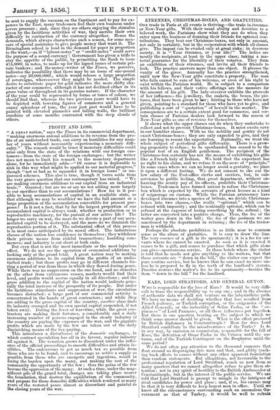PROFIT AND LOSS.
" A GREAT nation," says the Times in its commercial department, "making enormous annual additions to its revenue from the pro- fits of an undisturbed trade, can carry on hostilities for any num- ber of years without necessarily experiencing a monetary diffi- culty." The remark would be truer if monetary difficulties could arise only from the state of the relations with our foreign cus- tomers—from the state of the foreign exchanges ; but the writer does not mean to limit his remark to the monetary department alone, for he immediately adds—" Of course it is deplorable to sink in this way what might be applied to our material progress," though "not so bad as to squander it in foreign loans" or un- pursued schemes. This also is true, though it turns aside from the very grave question that our contemporary has raised. " We are making enormous additions to our capital from an industrial trade." Granted ; but are we or are we not adding more largely to our sacrifices than to our accumulations ? How far is it pos- sible to keep accumulations of capital in an available state, so that although we may be wealthier we have the full amount or a large proportion of the accumulation convertible for present pur- poses ? Is it not a fact, that by far the largest proportion of our accumulated capital is always sunk, whether in production or in reproductive machinery, for the pursuit of our active life ? The longer we carry on war, the more do we devote a part of our accu- mulated capital to be destroyed, and the more do we diminish the reproductive portion of it. The substantial effect of this process is in most cases anticipated by its moral effect. The industrious classes of the nation lose confidence in themselves ; they withdraw their private means from riskful transactions; hoarding com- mences; and industry is cut short at both ends. But even that is not the most immediate or the most injurious effect. We do not see the operation of economical additions by looking only at the grand total. A great nation may be making enormous additions to its capital from the profits of an undis- turbed trade ; but those profits may go in different channels du- ring a period of war from those in which they flowed during peace. While there was no suppression on the one hand, and no stimulus on the other from extraneous causes, markets would find their level, and profits would accrue equally in all directions ; and the gross addition to the capital of the nation would indicate gene- rally the total increase of the prosperity of its people. But under the factitious stimulants and suppression of war, the circulation becomes disturbed : a large part of our commercial activity is concentrated in the hands of great contractors ; and while they are adding to the gross capital of the country, another class finds its industry cramped and its own special capital suspended, if not taken away. During the fever of war-time, while the great con- tractors are making their fortunes, a considerable and a daily increasing number of persons engaged in the steady industry of the country are paying the expenses of the war, and the gigantic profits which are made by the few are taken out of the daily diminishing means of the tax-paying. This introduces a disturbance of the domestic exchanges, in which contract speculation has all in its favour, regular industry all against it. The vexation grows to discontent under the influ- ence of the official proceedings to smooth difficulties and attain fa- cilities. The endeavours to get as much tax as possible from those who are to be found, and to encourage as active a supply as possible from those who are energetic and ingenious, result in firing the burden upon the many, and making the cost of the community the opportunity of the few ; thus the gains of the few become the oppression of the many. At such a time, under the mag- nificent pile of the grand total, changes are taking place nearer the foundation, that destroy the equilibrium of the community, and prepare for those domestic difficulties which rendered so many years of the restored peace almost as discordant and painful its the closing years of the war.










































 Previous page
Previous page